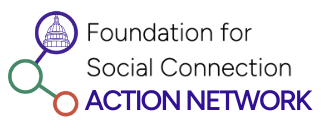“We believe that social isolation is not a personal choice or individual problem, but it’s really one that’s rooted in community design, social norms, and systemic injustices.”
– Jillian Racoosin, Executive Director, Foundation for Social Connection and the Coalition to End Social Isolation and Loneliness
Our Executive Director, Jillian Racoosin, was featured on Brian Peterson’s Crossing the Chasm, a podcast exploring how connection can cultivate human and ecological flourishing. Brian Peterson, PhD, is an associate professor at Northern Arizona University. As a professor and researcher, he explores the social dimension of climate change. Their conversation covered everything from advice for individuals who want to contribute to this body of work to Jillian’s own experience with loneliness. We’ve recapped highlights of their exciting and necessary conversation below. Listen to the full podcast here.
“I think all of us have experienced social isolation and loneliness and some more than others. And, of course, since the pandemic, we all have an understanding of how this can impact all of our lives,” said Jillian to start the conversation. She highlighted how the rates of social isolation and loneliness have been rising since the early 2000s for all age groups. She thoughtfully outlines the mission of the coalition; “What we’ve been focusing on is how can we move the needle forward in research and advocacy, in innovative interventions to address social isolation and loneliness and build more socially connected communities across the country.”
Other key conversation points:
- What is the difference between the loneliness we all feel from time to time and chronic loneliness, which the research warns is harmful to our health? (5:20)
- What are the health consequences of social isolation and loneliness according to Foundation for Social Connection Scientific Advisory Council Chair, Julianne Holt-Lunstad, and the Surgeon General, Dr. Vivek Murthy? (6:50)
- How are social isolation and loneliness a global health concern? (13:32)
- What are individual, interpersonal, and organizational interventions to promote social connection? (23:08)
- What can individuals do to become involved in this work? (Check out our upcoming in-person and virtual Global Loneliness Awareness Week event!) (29:30)
- How is Gen Z fighting the stigma of loneliness and other mental health concerns? (31:58)
- What are Jillian’s top priorities if she could change the world? Spoiler: she’d focus on social connection. (35:41)
“We really want to drive systemic change, thinking about how can sectors of society come together from a systems, policy, and environmental lever to really enact that change.”
– Jillian Racoosin (12:34)
These highlights just touch on the depth of insight offered by our own Jillian Racoosin in her engaging conversation with Brian Peterson. We recommend listening to the full conversation and considering this podcast’s core question: How can conversations about imagining and acting toward a better world foster community and connection?

